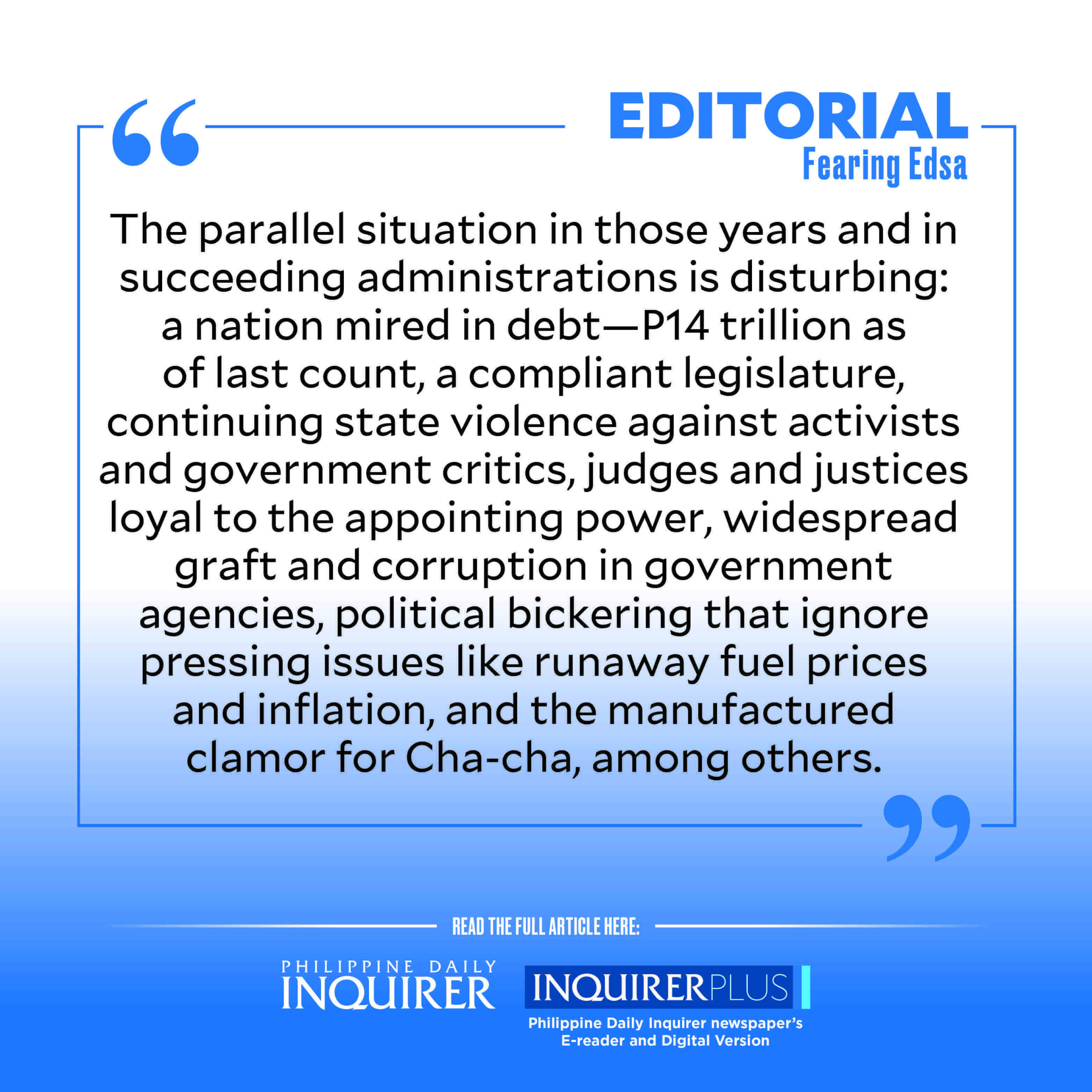Fearing Edsa

So who’s afraid of Edsa, the 1986 people power revolt that ousted strongman President Ferdinand Marcos Sr. and ended martial law, one of the darkest chapters in the country’s history?
The people behind Charter change (Cha-cha) for one, starting with those behind that controversial TV commercial aired in January. That 60-seconder was sponsored by Pirma, or the People’s Initiative for Reform, Modernization, and Action, the same group behind the 1997 unsuccessful attempt to remove constitutional term limits on elected officials.
One word stuck out like a sore thumb in that ad underwritten by donors who, given the ad’s vacuous message, understandably refused to be identified. That word is “Edsa-pwera,” a play on the colloquial term “etsa-pwera,” which means “excluded” or “rejected.”
Political dynasties
The TV commercial brazenly attributes the country’s ills to the 1987 Constitution, a product of the spontaneous four-day gathering that also restored the democratic space scrapped by martial law. As the ad would have viewers believe, Edsa was an event limited to a certain political demography that excluded the majority—na-Edsa-pwera. The scripted lines of the paid actors harped on how the Constitution needs to be changed since it had purportedly failed to deliver on its promises.
A statement from the #BuhayAngEDSA Campaign Network disputes this. The ad attempts to “diminish its legacy in our history as a nation and in our people’s continuing fight for justice and democracy,” it notes. The group adds that “as a post-dictatorship legacy, [the 1987 Constitution] provides powerful protections for our people’s rights … It also introduced fixed term limits for politicians, preventing their entrenchment in power and prohibiting political dynasties.”
Omission of Edsa people power
Aye, and there’s the rub. Despite proponents swearing that Charter amendments would be limited to economic provisions, the move would favor those who seek “to perpetuate themselves [… in] power,” the group contends, reflecting the widely-held view that Cha-cha would be used to advance political interests. “In the face of our nation’s pressing problems, present Charter Change initiatives are divisive, wasteful, and unnecessary,” the group said.
Aside from Cha-cha, the omission of Edsa People Power Revolution from the 2024 National Holidays, has also raised concern. The official explanation is that Feb. 25, which marks the culmination of the historic event, falls on a Sunday. “There is minimal socioeconomic impact in declaring such a day as a special nonworking holiday since it coincides with the rest day for most workers and laborers,” explains the Office of the President.
Power of ordinary citizens
That argument doesn’t wash. While Sundays still afford most people enough time to reflect on Edsa, declaring Feb. 25 as a special nonworking holiday would have been a boon to workers toiling on weekends. But more than the economic value, the message it conveys is loud and clear: Edsa should not be remembered, much less celebrated.This leads to another question: Why are there seemingly concerted efforts to bury and delete Edsa from people’s consciousness? What is there to fear about Edsa?
For one, the people-powered event is unqualified proof of the power of ordinary citizens to effect substantial change without resorting to violence or extralegal measures. Facing off tanks and military might while wielding only prayers and principles, people showed how far they were willing to go to shake off a dictatorship and reclaim their rights.
That unstinting determination is particularly relevant at this time, given the Philippines’ low ranking in the Democracy Index of the Economist Intelligence Unit. In the 2023 index released last week, the country was described as a “flawed democracy,” having dropped one spot to 53rd out of 167 countries.
A work in progress
While detractors continue to heap blame on Edsa for the country’s sorry state of affairs—conveniently forgetting that six presidents have since held the reins of government—such argument also serves as a timely reminder of how our aspirations for democracy remain a work in progress, with individual efforts needed to push us forward, as Inquirer columnist Edilberto C. de Jesus once put it.
The legacy of Edsa lies in us never forgetting the lessons we should have learned from 14 years of struggle under military rule. The parallel situation in those years and in succeeding administrations is disturbing: a nation mired in debt—P14 trillion as of last count, a compliant legislature, continuing state violence against activists and government critics, judges and justices loyal to the appointing power, widespread graft and corruption in government agencies, political bickering that ignore pressing issues like runaway fuel prices and inflation, and the manufactured clamor for Cha-cha, among others.
Will it take another Edsa to force meaningful change in the country’s chaotic political landscape? It’s an abiding fear among unworthy officials that we, as involved citizens, should constantly stoke.




















